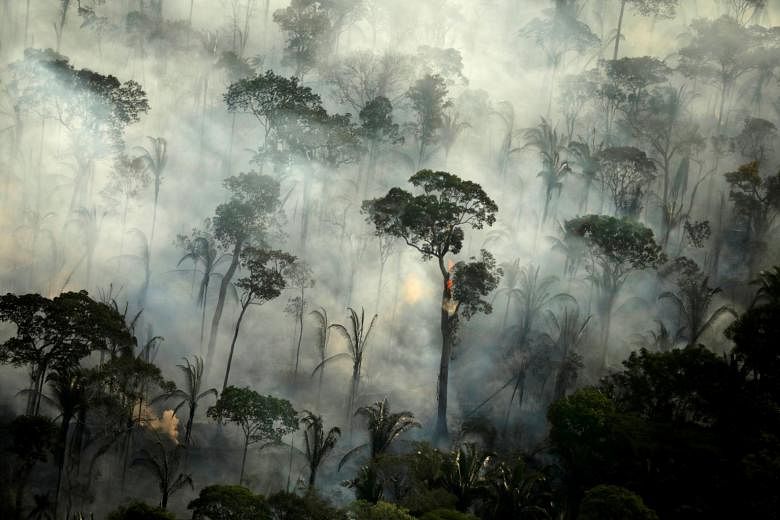Two sharply contrasting visions of the state of global affairs were put before business and political leaders gathered in Davos for the 50th edition of the annual meeting of the World Economic Forum (WEF).
The first might be called rosy - or robust, depending on your political persuasion - optimism. This was a picture painted by United States President Donald Trump, of economic growth and prosperity in America "like never seen before", and prospects for technological progress it "has not even imagined".
His opening remarks were followed almost immediately by a plea of anguished anxiety by Swedish climate activist Greta Thunberg. The world was not moving fast enough to avert a climate apocalypse, she charged. Governments were falling behind even on past commitments to do so, and leaders were failing their children by not acting to check global warming when they still could.
The 73-year-old President did not meet the 17-year-old activist, nor did they address each other directly. But their two strongly articulated positions, poles apart, resonated across the cavernous halls of the Congress Centre on Tuesday, the opening day of this week-long confab which will take up a dizzying array of other issues. These range from the looming tech cold war between the US and China, and inequality within and between states, to the impact of the devastating forest fires in Australia, and the dangers of deepfakes and misinformation campaigns.
Delivering an opening keynote address, Mr Trump hailed the "Great American comeback" unleashed by his administration. Brashly, he listed a string of accomplishments in his first term, from boosting economic growth and cutting unemployment to fostering a more inclusive and cohesive society in America.
"Today, I am proud to declare that the United States is in the midst of an economic boom the like of which has never been seen before," he said.
"I knew that if we unleashed the potential of our people, cut taxes, slashed regulation, fixed broken trade deals and fully tapped American energy that prosperity would come thundering back... and that is exactly what happened.
"Years of economic stagnation have given way to a roaring geyser of opportunity."
He held out his pro-worker, pro-citizen, pro-family approach as a model for development for the world, and called on it to reject the "prophets of doom and their predictions of the apocalypse".
These, he charged, were the inheritors of past naysayers, who had warned of overpopulation in the 1960s and 1970s, and later predicted an energy crisis when the world would run out of oil in the 1990s.
"These alarmists always demand the same thing: Absolute power to dominate, transform and control every aspect of our lives.
"We will never let radical socialists destroy our economy, wreck our country or eradicate our liberty."
On the contrary, he noted that new technologies had transformed the US into a major energy producer, which was now less reliant on unfriendly countries. He called on European countries to import more of their needs from the US.
He drew a parallel between tackling today's challenges and the leap of faith that helped build the impressive cathedrals found in Europe, such as the Duomo in Florence or Notre Dame in Paris.
These had taken hundreds of years to build, with leaders pressing ahead, confident they would be able to tackle challenges - sometimes when the technology needed to do so had yet to be invented when the projects began.
"This is not a time for pessimism," Mr Trump declared. "Fear and doubt is not a good thought process."
Against this Panglossian backdrop, Greta took to the stage and declared, a tad cheekily: "One year ago I came to Davos and told you that our house is on fire. I said I wanted you to panic. I've been warned that telling people to panic about the climate crisis is a very dangerous thing to do. But don't worry. It's fine. Trust me, I've done this before and I assure you, it doesn't lead to anything."
Meanwhile, forests in the Amazon and Australia were burning and being ravaged, she said.
Taking up her call for the speeding up of action to keep global temperatures from rising beyond the 1.5 deg C limit scientists have advocated, she demanded an immediate end to any further exploration for, or investments in, fossil fuels.
"We don't want these things done by 2050, 2030 or even 2021. We want this done now," she said, urging leaders to act "as if you love your own children above all else".
Noting that the move by the US President to pull his country out of the Paris climate accord had rightly caused outrage among many, she added, pointedly: "But the fact that we're all about to fail the commitments you signed up for in the Paris Agreement doesn't seem to bother the people in power even the least."
So, what to make of these contrasting positions, which resonate with their respective champions and supporters, causing further polarisation on the way forward?
That is what participants spent much of the day discussing, and will continue to do so in the next few days.
But as several speakers at panel sessions through the day noted, the world will need to go beyond the sunny optimism of Mr Trump and the outraged anxiety of Greta if it is to find realistic answers to the global challenge of climate change, along with the many others it is grappling with concurrently, within and between states.
As one speaker, Mr Oliver Bate, CEO of Germany-based insurance company Allianz, put it: "We need to move from outrage to practical things to actually address this."
What was needed were solutions based not so much on rhetoric but backed by scientific evidence, he said. Businesses seemed to be pressing ahead of governments on this score, he added, but even they needed to be more like start-ups and shoot for tenfold advances in their efforts to curb emissions, rather than just aiming for doubling the outcomes.
"We don't have 30 years to do this," he said, acknowledging Greta's pleas. "But without proper support of the governments, in the US, China and India, it will be futile."
One such practical solution was unveiled yesterday by the WEF: A major reforestation plan to bring businesses, governments and community groups together in an effort to plant one trillion trees.
The idea behind this is that such nature-based solutions - locking up carbon in the world's grasslands, forests and wetlands - can provide up to one-third of the emission reductions required by 2030 to meet the Paris Agreement targets.
The environmental benefits of tree planting have long been known in Singapore, which championed this idea long before it became politically fashionable, with its annual tree planting days led by founding Prime Minister Lee Kuan Yew, who planted a mempat tree way back in 1963 to kick-start the city's greening efforts.
But even tree planting is not uncontroversial these days, with critics noting that some efforts have been little more than "greenwashing" publicity efforts by businesses to be seen as doing something to offset their carbon emissions, while other initiatives have been charged with impacting local ecosystems by introducing non-native species.
Yet, the underlying issue is this: Polarisation has rarely solved problems, but rather tends to exacerbate them, as societies and interest groups are pulled farther apart, making the necessary trade-offs and compromises called for in any solution harder to achieve.
The beauty of the Davos forum is that, amid the calming setting of this charming Alpine ski resort, all sides of the argument will be given a careful and considered hearing.
But as became plain yesterday, the leaders gathered here - and well beyond - will have to find ways to bridge the yawning gaps in an increasingly divided global community if they are to make a stab at "improving the state of the world", as the forum has striven to do for the past 50 years, and counting.


